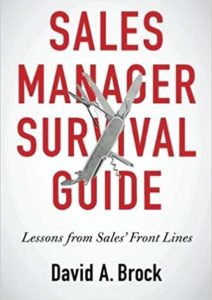Teaching our customers is a cornerstone of recent sales advice (see, for example, The Challenger Sale, Insight Selling, Upside Down Selling, and Agile Selling). Today the helpful, knowledgeable salesperson is showing up in best-in-class sales organizations. Helping customers learn is really not a new idea — salespeople have always been teachers. Nowadays, however, we’re not just teaching about our own product, solution, or brand — the context has changed.
Customers, sales, and marketing have all been improved as a result of the sales focus on sharing broader lessons. Salespeople teach customers and prospects about their industry, customers, and markets. They can often contribute real business value and demonstrate what could be done better or differently. They can strategize, show how businesses can engage more effectively, and make positive changes to employees, user communities, and new initiatives.
I spent some time with my niece recently–she’s a schoolteacher. I couldn’t resist getting some dedicated instruction from a professional — one who makes her uncle proud. I was interested to see how much I (as a sales professional) had to learn about the art of teaching.
She started off talking about tenets like critical thinking, problem solving, listening, sharing, collaborating, and discovery. She talked a lot about how people learn, and how to discover each person’s learning style. She spoke about adaptability–moving from lowest-common-denominator lessons to personalized, customized approaches. As the conversation progressed, it struck me that, as salespeople, we’ve been doing this “teaching” thing all wrong.
Pupils don’t learn best from well-rehearsed presentations, with tightly controlled facts, statistics, and graphics — but that’s what we take into the fray with us. It’s the way we often approach a sales call.
Effective teaching isn’t sterile or slickly scripted — it starts with our own expertise. We need deep knowledge of our subject matter, so when we talk to our customers about their business lives, they trust us and are confident in our abilities. Further into the relationship, we’ll be able to talk about applying our solutions to their business, but that’s not the foundation of a sale. The foundation is our expertise and credibility, our ability to show them we understand their ecosystem, their competitors, emerging industry trends, their risks. Without solid expertise, who would trust us to teach them?
But this core competency to teach goes further than expertise in their businesses; it requires us to learn about our customers as people, not enterprises. How can I help them most? How can I teach most effectively? How do I engage them and encourage them to think about their business in a different way? What is it that they really need to know and how can I overcome the obstacles and help them change their business for the better?
The answers are probably not in our sales playbook — this kind of teaching is adapted to the needs and interests of the individual. Effective teaching is less about telling, and more about discovery, interaction, collaboration, and the joy of discovery. That’s how my niece’s students learn, and that’s how our customers and prospects learn, too — by being participants, not just an audience for rote lessons.
According to my niece, teaching is less about telling our customers the answers than helping them discover and develop the answers themselves. It looks a lot different from a sales pitch. It’s a conversation where we share differing perspectives and ideas.
I took this lesson to heart: We must teach our customers by learning about them, from them, and with them.











